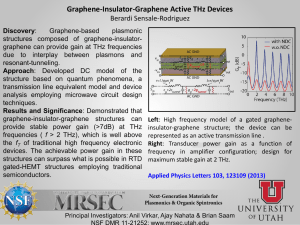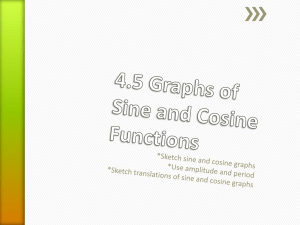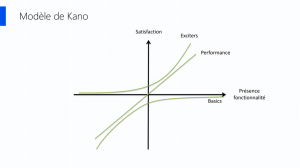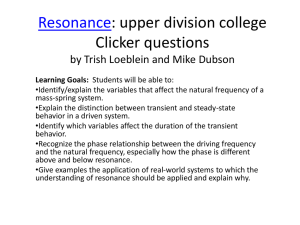Time (ps)
advertisement
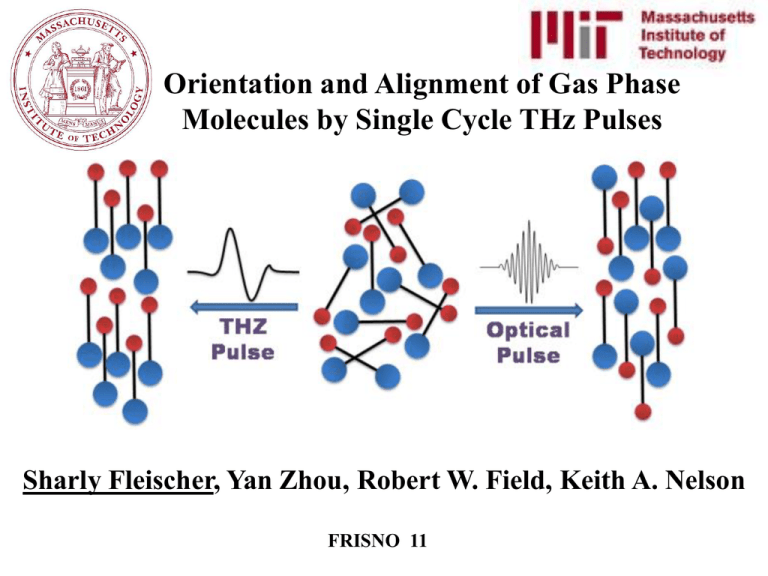
Orientation and Alignment of Gas Phase Molecules by Single Cycle THz Pulses Sharly Fleischer, Yan Zhou, Robert W. Field, Keith A. Nelson FRISNO 11 Multiphoton Ionization Self focusing & Filamentation n n0 n2 I Up – Down Symmetry Conserved High Harmonic Generation Ultrafast x-ray diffraction DC field Not Field Free ! + - Approaches for field – free orientation Sakai and colleagues: DC electric field + laser pulse with adiabatic turn-on and nonadiabatic turn-off. A. Goban, S. Minemoto, and H. Sakai, “Laser-Field-Free Molecular Orientation,“ Phys. Rev. Lett. 101, 013001 (2008). Approaches for field – free orientation Vrakking and colleagues: Hexapole state selector (Producing molecules in a single quantum state) + a combination of a DC and intense fs laser field. O. Ghafur, A. Rouzée, A. Gijsbertsen, W. K. Siu, S. Stolte and M. J. J. Vrakking, “Impulsive orientation and alignment of quantum-state-selected NO molecules,” Nature Phys. 5, 289-293 (2009). Approaches for field – free orientation Holmegaard and colleagues: Electrostatic quantum state selector + deflector combination of a DC and femstosecond laser field. L. Holmegaard, J. L. Hansen, L. Kalhøj, S. L. Kragh, H. Stapelfeldt, F. Filsinger, J. Küpper, G. Meijer, D. Dimitrovski, M. Abu-samha, C. P. J. Martiny and L. B. Madsen, “Photoelectron angular distributions from strongfield ionization of oriented molecules,” Nature Phys. 6, 428-432 (2010). Approaches for field – free orientation Kling and colleagues: two-color excitation scheme in which the fundamental laser frequency (800 nm) is mixed with its second harmonic with a specified relative phase. S. De, I. Znakovskaya, D. Ray, F. Anis, Nora G. Johnson, I. A. Bocharova, M. Magrakvelidze, B. D. Esry, C. L. Cocke, I.V. Litvinyuk, and M. F. Kling “Field-Free Orientation of CO Molecules by Femtosecond Two-Color Laser Fields,” Phys. Rev. Lett. 103, 153002 (2009). Optical Pulse vs. Half Cycle Pulse 1.3 fs ˆ2 L Hˆ V ( , t ) 2I V ( , t ) cos( ) V ( , t ) cos2 ( ) dV ( ) d ( ) sin(2 ) dV ( ) d ( ) sin( ) Ultrashort optical pulse Half cycle pulse ( ) sin(2 ) ( ) sin( ) Alignment 2 cos Orientation cos Density matrix – non resonant 13 T 11 24 T 22 31 35 T 33 42 53 Population Transfer T 44 V cos J J 2 2 T 55 Coherences Alignment cos2 cos2 population cos2 coherence Density matrix – non resonant 11 x x 13 x 15 x x x x x x x x x 24 22 31 42 51 35 33 44 53 55 Population Transfer V cos J J 2 2 Coherences Alignment cos2 cos2 population cos2 coherence Density matrix - resonant T 11 12 21 T 22 23 32 T 33 34 43 T 44 45 54 T 55 Orientation cos Population Transfer V cos J J 1 Coherences Density matrix - resonant 11 12 13 14 15 21 22 23 24 25 31 32 33 34 35 41 42 43 44 45 Population Transfer 51 52 53 54 55 Orientation and Alignment V cos J J 1 Coherences Short summary Non resonant Resonant | J , m | J 2, m | J , m | J 1, m May induce only even rotational coherences May induce all the rotational cohernces No orientation Only alignment Both orientation and alignment Intense single cycle THz pulse LiNb K. L. Yeh, M. C. Hoffmann, J. Hebling and K. A. Nelson, “Generation of 10 μJ ultrashort THz pulses by optical rectification”, Appl. Phys. Lett. 90, 171121 (2007); “But you don’t have a Half Cycle Pulse !!!” E (t )dt 0 Amplitude (a.u) Time (ps) Spectral Amplitude (noramlized) Amplitude (a.u) Time (ps) Population Transfer J,J+1 J,J+2 coherences Non - Resonant Amplitude (a.u) Amplitude (a.u) Resonant Frequency (THz) J states (m=0) Time(ps) J states (m=0) Time(ps) 39.8ps Revival Revival EO sampling O=C=S /4 Pellicle BS ZnTe W PD PD G LiNb Delay BS Laser EO sampling, OCS, 250torr Amplitude (a.u) 1 Trev 2 Trev Reflections Reflections Time (ps) 3 Trev Detection of Molecular Alignment Pellicle BS O=C=S /4 Pellicle BS ZnTe P W PD PD PD P 450 to THz polarization G LiNb Delay BS Delay BS Laser Alignment of OCS, 350torr, 300K Intensity (a.u.) 1 T 2 rev 1 Trev 3 T 2 rev Population Transferred To higher J’s Time (ps) Non thermal rotational distribution Time independent alignment Each molecule is forced to rotate in a plane cos 1/2 2 Intensity (a.u.) Decay of population (T1) I population 11.6 e Time (ps) t 173 ps Intensity (a.u.) Decay of coherence (T2) I coherence 25.5 e Time (ps) t 57 ps Intensity (a.u.) Rotational state distribution (J) Experimental alignment factor I n L sin( ) I c 1.8 10 8 3N 2 n ( cos 1/ 3) 4n 0 3.9 10 5 0 0 1Trev 1/ 2Trev Amplitude (a.u) Max Orientation @ 1Trev (x102) Max Alignment @ 1/2Trev(x104) Time (ps) 8% 5% orientation 1% Peak field amplitude (a.u.) Summary Table top single cycle THz pulses can induce significant field-free orientation under ambient conditions Relatively high orientation is not necessarily associated Requires with high degree of alignment. With jet cold molecular samples, higher degree of orientation is expected. Combining optical and THz pulses may enable two independent handles for manipulating molecular angular distributions in 3D. Thank you


